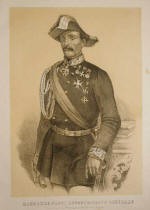Son of Antonio Fanti and Silea Ferrari Corbolani, Manfredo grew up in the Duchy of Modena. In 1825 he joined the Pioneer Corps in the army and after five years of study graduated as an officer in the Engineer corps (Genio).
In 1831 he joined the Modenese Government of insurrection (with Ciro Menotti) which had taken power after Duke had fled. He fought in the Romagna with the troops of Carlo Zucchi, distinguishing himself at the combat at Rimini on 25 March. But this success was short lived. After the capitulation of Ancona, he was condemned to death but escaped to France where he enrolled in the Engineer corps of the French army (Génie). In 1834 he took part in Mazzini's revolutionary uprising (the so-called Invasion of Savoy).
In 1835 he went to Spain, remaining there for thirteen years. He volunteered in the army of regent Maria Cristina in the war against the Carlists. In 5th Battalion of Catalonia, he rose through the ranks from lieutenant, to captain and then major. In 1839, he entered the regular Spanish army and in 1847 was promoted to colonel in the cavalry acting chief quartermaster for the headquarters in Madrid. During this period he married Carlotta Tio de Valencia.
He returned to Italy in 1848 on the outbreak of the war against the Austrian occupation of Italy, offering his services to the King of Piedmont Sardinia and to the Lombard Provisional Government. He was not however to receive a command until July, when the Lombard government appointed him to prepare the defences of the city of Vicenza, with the rank of major general. After the retreat from Venetia, he took part in the abortive defensive operations at Brescia, Milan and Alessandria. In Milan he played a role in the protection of king Carlo Alberto from Milanese angry that the city had once again been handed over the Austrians.
In November 1848 he took command of the 2nd Brigade of the «Divisione Lombarda», a band of Lombard volunteers, with the rank of Brigadier general. In 1849 he was admitted into the Piedmontese Congresso consultivo permanente di guerra (Standing consultative congress for war) and appointed member for the Collegio di Nizza Monferrato.
He took part in the campaign of 1849 under general Gerolamo Ramorino. After the defeat at the battle of Novara on 23 March, Ramorino was held responsible for the defeat and shot for cowardice.
In April 1849 he prevented his Lombards from siding with the Genoese in revolt – La Marmora was to exact harsh punishment for the uprising. But because of his links to revolutionary Mazzini, Fanti was seen as suspect and court-martialled – he was held co-responsible with Ramorino for the defeat at Novara. Whilst he was not found guilty, he was nevertheless distanced from the army.
His semi-disgrace lasted until 1855 when he was appointed commander of the Second Piedmontese Provisional Brigade during the Crimean War campaign.
At Magenta, Palestro and San Martino he held the rank of Lieutenant General commanding the 2nd Division, As a result of his distinguished action at these three battles he was awarded the Knight's Cross of the Military Order of Savoy.
After the armistice of Villafranca he was given the task of reorganising the division formed from Lega dell'Italia Centrale (the League of Central Italy) comprising the Grand Duchy of Tuscany, the Duchy of Parma, the Duchy of Modena, and the Papal Legations. This corps of 45,000 men was significantly active in the prevention of Franz Josef's attempt (in concert with Francesco II and Pius IX) at restoration at the end of the same year in the Grand Duchy of Tuscany, the duchies of Modena and Parma and Legations. The physical symbol of the change was given when Fanti founded the new Modena Military Infantry School in the deposed duke's palace. Fanti also stopped the triumphant Garibaldi from proceeding (without the assent of Napoleon III) towards Umbria and the Marches.
This success led Cavour (back in government following a brief period of resignation after the armistice of Villafranca) to make Fanti Minister for War and Navy. His first ministerial act was to incorporate the Army of the Lega dell'Italia Centrale into the Sardinian Army.
On 29 February, 1860, the king appointed Fanti as a senator. Slightly more than two months later (5 May) the expedition of Garibaldi's 1,000 red shirts took place, and Fanti was appointed head of the army corps which would operate in central Italy. In this capacity, he played a role in the liberation of the Marches and Umbria (battle of Castelfidardo) and as a result he was decorated with the Grand Cross of the Military Order of Savoy.
He then became general and chief of staff for the army in Southern Italy: he defeated the Bourbons at the Battle of Mola, and for his role in the successful siege and taking of Gaeta (13 February, 1861) he was decorated with the gold medal for valour, by royal decree dated 1 June, 1861.
On 4 May, 1861, in Turin, Fanti as Minister for War was proud to declare that Royal Army, previously the Army of Sardinia was now called the Army of Italy. He was soon to fall from favour in the public's eyes, however, when he refused to allow 7,000 officers from Garibaldi's Army of the South access (at the same rank) to the Royal Army.
On the death of Cavour, on 7 June, 1861, he retired from the ministry to take command of the VII Corps. He was however prevented from pursuing this role by a serious illness which forced him leave public life in 1863 and which finally caused his death two years later in Florence.


